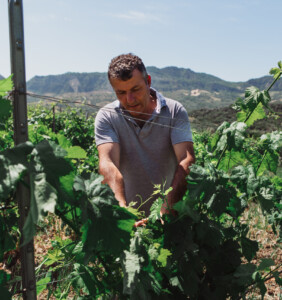Aspromonte

Pasqualino Polifroni
About
Owner & winemaker: Pasqualino Polifroni
Vineyards: 3ha, all estate-owned
Vineyard management: Certified organic
Soils: Medium-textured clay rich in fossils
Grapes grown: Mantonico, Magliocco, Greco Nero, Syrah
Annual production: 12,000 bottles
Quick facts:
- Pasqualino Polifroni makes wine from a few hectares of vines planted in the shelter of Aspromonte National Park.
- While his vineyards are the only ones in the immediate area, ruins of palmenti from the Roman and Byzantine eras prove that there was a long history of winemaking there.
Pasqualino Polifroni returned to his native Calabria in 2000 after spending years working in northern Italy. The property he took over, which would become Aspromonte, was primarily focused on growing raspberries, blueberries, and bergamot at the time. In 2008, Pasqualino decided to plant a small vineyard, hoping to make wine for himself and his family. He quickly caught the winemaking bug and expanded, planting more vines and establishing a cellar.
The land that became the Aspromonte vineyards had previously been used as grazing pasture for animals, so it had never been working prior to planting and had never seen chemicals. “It’s as if Mother Nature created it,” Pasqualino says. “It’s located in a context that’s as naturalistic as possible, in the shelter of the Aspromonte National Park, rich in plants, animals, and microorganisms that live and interact in perfect harmony. It’s surrounded by meadows and woods and our vineyard is the only one in the area.” While establishing vineyards where none existed before was a challenge, he was encouraged by the ruins of numerous “palmenti” (traditional winemaking structures) from the Roman and Byzantine eras: proof of a two-thousand year history of making wine in this area.
Constant winds from the Aspromonte mountain, from which the winery takes its name, ensure that the vineyard is always well-ventilated, so farming organically is relatively easy. The main challenge is periods of extreme heat and drought, exacerbated by climate change here as in many other wine regions at this southerly latitude.
“In the cellar we work without any particular secrets or miracle technologies,” Pasqualino tells us. He seeks to express terroir by using organic grapes from autochthonous vines and fermenting spontaneously with native yeasts. “The wines that I make must be before all else ‘clean.’ They must be digestible and not fatiguing for the people who drink them. Therefore wines that are not too high in alcohol, with lower sulfites (30-40mg/L), not clarified and not filtered.”

